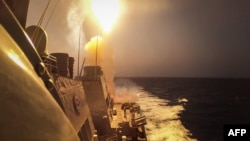After Hamas’ October 7 attack sparked the Israel-Hamas war, Hamas supporters have increasingly targeted Middle Eastern waters with anti-Israeli attacks.
Yemen’s Iran-backed Houthi rebels have conducted several hostile maritime operations to signal their solidarity with Palestine and opposition to Israel. Houthi, officially Ansar Allah, is a Shia Islamist political and military organization that controls roughly one-third of Yemen’s most-populated territory.
On December 3, Houthi rebels launched a barrage of drone and missile strikes on commercial ships in the Red Sea, hitting three vessels.
The Houthis claimed responsibility for two of the attacks.
Responding to distress calls from the vessels under attack, the USS Carney, an Arleigh-Burke Class destroyer, “engaged and shot down” several unmanned aerial vehicles “launched from Houthi controlled areas in Yemen,” U.S. Central Command said.
“These attacks represent a direct threat to international commerce and maritime security,” the U.S. Central Command said. “The United States will consider all appropriate responses in full coordination with its international allies and partners.”
Yemen's Houthi Revolutionary Committee president, Mohammad Ali Al-Houthi, responded by denying the right of the U.S. military to be in the region, or to respond to those attacks.
“The Americans have no right to the Red Sea to announce that they reserve the right to respond. And to confirm this, they will not accept any military presence by China or Russia or others in the regional waters, for example near Florida or elsewhere,” Al-Houthi claimed in a December 3 post on X.
That claim is false.
Under international law, there is nothing prohibiting U.S. military vessels from navigating international waters or defending themselves or others from destructive attacks.
The Houthis, an armed-non state actor, have repeatedly targeted vessels engaged in global shipping, illegally threatening international navigation and maritime security.
“The world’s commercial fleet engaged in transporting the world’s goods and exercising the right of freedom of navigation in the Red Sea, is entitled to do so safely and without fear of attack,” a spokesperson for the London-based International Chamber of Shipping, one of the world's principal shipping organizations, told Polygraph.info in a written comment.
“However, as we have seen in this case and previous incidents, commercial ships can become vulnerable to attack when traversing areas of high political tension, such as the Red Sea, at this time,” they said. “The international community has an obligation, indeed a duty, to protect the commercial fleet from such attacks.”
The Houthis have attempted to claim the commercial ships are “legitimate targets” by labeling them as being “Israeli” or “associated with Israelis.”
The same justification was used when Houthis hijacked the Bahamas-flagged Galaxy Leader commercial ship last month. Galaxy Leader is owned by Abraham Ungar, an Israeli international shipping mogul, although the ship is operated by Nippon Yusen, a Japanese shipping company.
Under Article 92 of the United Nations Convention on the Law of the Sea (UNCLOS), ships are subject to the “exclusive jurisdiction” of the flags under which they fly.
None of the ships attacked by the Houthis on December 3 are registered in Israel, fly the flag of Israel, or are otherwise connected to a state or entity that is party to the Israel-Hamas conflict.
The Israeli Defense Force has likewise said none of the ships have links to the state of Israel.
The first ship to be hit on December 3, the Unity Explorer, is owned by U.K.-registered Unity Explorer LTD.
Reports indicate that Unity Explorer LTD’s director, David Ungar, has Israeli citizenship, although he is also a British national who resides in the United Kingdom.
The Unity Explorer is a Bahama-flagged cargo carrier and thus subject to the laws and regulations of the Bahamas.
The next ship to be struck by the Houthis was M/V Number 9, a Panama-flagged container ship owned by Number 9 Shipping Ltd, which is managed by Newcastle-upon-Tyne, UK-based Bernhard Schulte Shipmanagement, Reuters reported.
The third ship that came under attack, AOM Sophie II, is a bulk carrier registered in Panama that flies the Panamanian flag.
Even when transiting Bab el Mandeb, a straight that connects the Red Sea and the Gulf of Aden, Article 19 of UNCLOS allows foreign ships, including military vessels, to pass through Yemen’s territorial waters so long as that passage is “not prejudicial to the peace, good order or security of the coastal state.”
“All of the incidents to date have occurred outside Yemeni territorial waters, but even if they were within territorial waters, these attacks would still constitute a violation of international law, in particular the right of innocent or transit passage and the fundamental rights of the seafarers onboard to carry out their work and to do so without fear of attack,” the spokesperson for the International Chamber of Shipping said.
The right for the U.S. ships to defend themselves and others from unprovoked attack is also recognized under international law.
According to an overview of laws governing naval operations in both peacetime and during armed conflict complied by the U.S. Naval War College: “International law, embodied in the concept of collective self-defense, provides authority for the use of proportionate force necessary for the protection of foreign flag vessels and aircraft and foreign nationals and their property from unlawful violence, including terrorist or piratical attacks, at sea.”
Per the ongoing war between Israel and Hamas, issues of proportionality regarding acts of self-defense are subject to debate.
In this instance, the USS Carney only shot down the unmanned drones launched from Houthi controlled areas in Yemen. The U.S. did not launch retaliatory strikes on Yemeni soil against the Houthi forces that launched the attacks.






